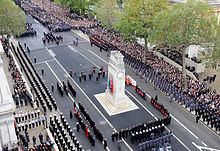Remembrance Sunday

Remembrance Sunday is a memorial day in the United Kingdom and the Commonwealth of Nations commemorating the contribution of British and Commonwealth soldiers and civilians who served in both World Wars and later conflicts. It is celebrated annually on the second Sunday in November, i.e. the Sunday closest to November 11th ( Armistice Day ). The latter marks the anniversary of the cessation of hostilities in World War I through the Compiègne Armistice in 1918.
National Service of Remembrance in London
In the UK, a National Service of Remembrance is held at the London Cenotaph on Remembrance Sunday . After two minutes of silence , wreaths are placed. The first wreath was traditionally laid by the monarch, since 2017 the Prince of Wales took over . This is followed by members of the Royal Family, the Prime Ministers and other heads of government of the Commonwealth (if present), other politicians and diplomatic representatives from the Commonwealth and the British overseas territories , then representatives of the armed forces and civil service organizations. The Bishop of London then gives a short devotional address.
After the ceremony, there will be a veteran parade organized by the Royal British Legion . When the march reaches the Guards Memorial across from Horse Guards Parade , a member of the royal family receives a salute.
In 2018, Federal President Frank-Walter Steinmeier was the first German head of state to take part in the cenotaph celebrations. The British government viewed this as a "historic act of reconciliation" between the two countries.
Other UK regional events

Events similar to those in London take place in the capitals of the country, such as the Scottish National War Memorial in Edinburgh , the Welsh National War Memorial in Cardiff and the Northern Ireland War Memorial in Belfast . There are also numerous memorial events in smaller places.
Events outside of the UK
In the Republic of Ireland , an ecumenical service is held annually on Remembrance Sunday at St. Patrick's Cathedral in Dublin . Similar ecclesiastical events take place in many places where Anglican churches or the Church of Scotland are represented. Ceremonies also take place on this day in places outside the Commonwealth that have a central memory character, such as the Menin Gate in Ypres .
In connection with other memorial days
From 1919 to 1945, Armistice Day on November 11 was the sole day of remembrance. Thereafter, the celebrations were moved to Remembrance Sunday, but since the 50th anniversary of the end of World War II in 1995, both Armistice Day and Remembrance Sunday have been celebrated.
In 2006, Chancellor of the Exchequer Gordon Brown suggested that in addition to Remembrance Sunday, a new Day of Remembrance should be introduced to recognize the achievement of veterans. This "Veterans Day", which was celebrated in the summer, thus fulfilled the function of Veterans Day of the same name in the United States. This commemoration day has been called " Armed Forces Day " since 2009 to honor all current and former members of the armed forces.
Web links
Individual evidence
- ↑ "Grateful for reconciliation, hopeful for a future in peace and friendship." Spiegel Online , November 11, 2018, accessed on the same day.
- ^ Prince Charles leads nation's tributes to war dead at the Cenotaph as the world marks First World War centenary. The Daily Telegraph , November 11, 2018, accessed the same day.
Remarks
- ↑ The second Sunday in November can only fall on one of the seven days November 8-14, inclusive. It is therefore always a maximum of three days away from November 11, while all other Sundays are at least four days apart.
